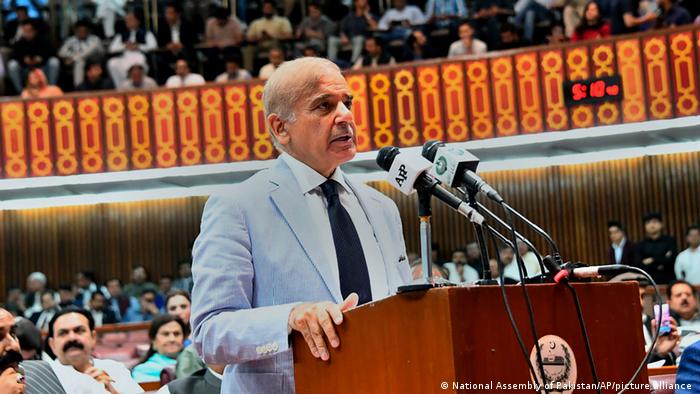The fundamental tenet of Pakistan’s existence has been its hate for India. No matter who got appointed as head of the state, he/she had to cater to the anti-India sentiments. But, there have been some silver linings in the past. Nawaz Sharif was one of them. Now, experts have pinned their hopes on his brother Shahbaz Sharif.
Shahbaz Sharif’s appointment and the burden of his brother’s legacy
Though it is no longer a surprise, Pakistan just witnessed one more change of guard. Once again, a sitting Prime Minister lost the support of the military establishment and was forced to resign. Imran Khan’s ousting meant that Shahbaz Sharif, the younger brother of Nawaz Sharif will be the new Prime Minister of Pakistan. Though Shahbaz has got the active support of the army, which has historically been anti-India, many believe that he can reignite his brother’s legacy.
When it comes to foreign affairs, Shahbaz’s brother Nawaz Sharif is considered to be the best Prime Minister in Pakistan’s history. His efforts towards building ties with India deserve special accolades in the literature documenting international affairs. In spite of active repulsion from his army, Nawaz went on to strengthen ties with the Atal Bihari Vajpayee’s administration.
Lahore Declaration was killed by Pak Army
When Sharif came to power in 1997, his core attention was on improving domestic infrastructure. However, as soon as it got confirmed that Prime Minister Atal Bihari Vajpayee will be in charge of India, Sharif shifted his focus towards improving ties with India. He developed a personal rapport with Prime Minister Vajpayee. Both Prime Ministers deeply respected each other.
Read more: Despite being exiled, Nawaz Sharif is ensuring that Pakistan gets reset
On 23 September 1998, Sharif and Vajpayee governments signed an agreement regarding recognising the importance of bilateral peace between both countries. The agreement was aimed at solving all bilateral conflicts between two countries. Meanwhile, Sharif sent an invitation to PM Vajpayee for a visit to Pakistan.
Atalji responded in style. He took a bus from Delhi and arrived in Lahore on 19th February 1999. The bus was full of designated individuals of the era. It was actually inauguration of the Delhi-Lahore Bus service, which later became a permanent fixture. Two days later, the historic Lahore Declaration was signed by respective Prime Ministers. It established the understanding that both newly formed nuclear powers won’t be competing with each other for supremacy.
The event was hailed among the international community as a thaw between both countries. However, it later turned out that Permanent Islamabad (Pakistan’s military) was not fully on board. Within a few months, the Pakistani army attacked India in Kargil, which escalated into a war, whitewashing all of Sharif’s efforts. Later, Sharif resigned from his post in October 1999.
Nawaz tried to improve ties during PM Modi’s era as well
In spite of having failed in his previous stint, Nawaz tried to improve relations with India in his third term as Pakistan PM as well. Nawaz actively attended the inauguration ceremony of Prime Minister Modi on 26 May 2014. Nawaz became the first head of state of Pakistan to attend the inauguration of India’s Prime Minister.
In May 2014, Sharif was able to secure an agreement on Non-Discriminatory Market Access on Reciprocal Basis (NDMARB) status for the two countries. It was meant to liberalise trade with India. Reportedly, the Pak army again thwarted this effort and forced Nawaz to stop liberalising trade relations with India. Nawaz however kept pushing for better ties with India. In 2015, he is reportedly said to have met PM Modi on the sidelines of 2015 SAARC summit.
On 25th December 2015, PM Modi’s plane made a surprise landing in Lahore to extend birthday wishes to Nawaz Sharif. However, the friendship offered by PM Modi was returned with a ghastly URI attack. Later, India also retaliated with surgical strikes. After the URI attack, India decided to not take Pakistan onboard towards resolving the Kashmir issue. India removed Article 370 and opened the gate for full integration of Kashmir into India.
The situation has only worsened in the last few years. Imran Khan’s election campaigning was based on his anti-India rhetoric. His fan base is full of jingoistic Pakistanis. Though he later tried to persuade India but his election campaigns had done all the damage they could.
Read more: Ditched by Rawalpindi, Is Imran Khan pleasing India to get citizenship?
Shahbaz comes with hope
Now, Shahbaz Sharif has emerged as a glimmer of hope. In his response to PM Modi’s congratulatory tweet, Shahbaz wrote, “Thank you Premier Narendra Modi for felicitations. Pakistan desires peaceful & cooperative ties with India. Peaceful settlement of outstanding disputes including Jammu & Kashmir is indispensable. Pakistan’s sacrifices in fighting terrorism are well-known. Let’s secure peace and focus on socio-economic development of our people”
Thank you Premier Narendra Modi for felicitations. Pakistan desires peaceful & cooperative ties with India. Peaceful settlement of outstanding disputes including Jammu & Kashmir is indispensable. Pakistan's sacrifices in fighting terrorism are well-known. Let's secure peace and.. https://t.co/0M1wxhhvjV
— Shehbaz Sharif (@CMShehbaz) April 12, 2022
Frankly speaking, the territory of Pakistan is an Army estate, surrounded by civilians. But, for the first time, a sitting Prime Minister has made way for his incumbent in a democratic manner. If Shahbaz is able to secure democratic values and simultaneously weed out radical elements, then good times are ahead for India-Pakistan relations.
